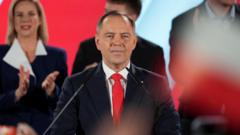In a landmark development, the European Union has forged a new trade agreement with Argentina, Brazil, Paraguay, and Uruguay, marking a significant step in enhancing economic relations between the two regions. European Commission President Ursula von der Leyen labeled the agreement as a "truly historic milestone" amidst a backdrop of escalating global confrontations.
EU Strengthens Ties with South America Through New Trade Agreement

EU Strengthens Ties with South America Through New Trade Agreement
The EU announces a significant trade deal with four major South American nations, emphasizing mutual benefits amid global tensions.
The new deal seeks to remain resilient where a prior agreement reached in 2019 faltered due to ratification hurdles with EU member states. If passed, it will reduce tariffs on both sides, streamline customs processes, and grant the EU improved access to essential raw materials. Speaking at a press conference in Montevideo, von der Leyen explained this will ultimately benefit European citizens with increased job opportunities and lower prices.
Last year, Europe’s trade with these South American nations amounted to nearly $116 billion, with Europe exporting goods like automobiles and pharmaceuticals while importing vital minerals such as lithium and nickel, crucial for electric vehicle batteries. As both blocs encompass 700 million people and 20% of the global economy, there's a strong push to capitalize on this pact's potential.
Despite progress, challenges remain. Concerns from countries like France and Poland linger regarding competitive discrepancies in agricultural regulations. Following the announcement, French Trade Minister Sophie Primas reiterated that the agreement's signing was merely a political conclusion and that her nation will continue to advocate for farmers' interests.
Uruguay's President Luis Lacalle Pou expressed optimism for the smaller Mercosur economies, stating it is vital for them that global trade opens up. The deal's outcome will depend on whether EU member states can overcome these reservations, with Germany keen on leveraging this opportunity amid its current economic challenges. As negotiations persist, all eyes remain on the EU's ability to unify its diverse interests.
Last year, Europe’s trade with these South American nations amounted to nearly $116 billion, with Europe exporting goods like automobiles and pharmaceuticals while importing vital minerals such as lithium and nickel, crucial for electric vehicle batteries. As both blocs encompass 700 million people and 20% of the global economy, there's a strong push to capitalize on this pact's potential.
Despite progress, challenges remain. Concerns from countries like France and Poland linger regarding competitive discrepancies in agricultural regulations. Following the announcement, French Trade Minister Sophie Primas reiterated that the agreement's signing was merely a political conclusion and that her nation will continue to advocate for farmers' interests.
Uruguay's President Luis Lacalle Pou expressed optimism for the smaller Mercosur economies, stating it is vital for them that global trade opens up. The deal's outcome will depend on whether EU member states can overcome these reservations, with Germany keen on leveraging this opportunity amid its current economic challenges. As negotiations persist, all eyes remain on the EU's ability to unify its diverse interests.






















